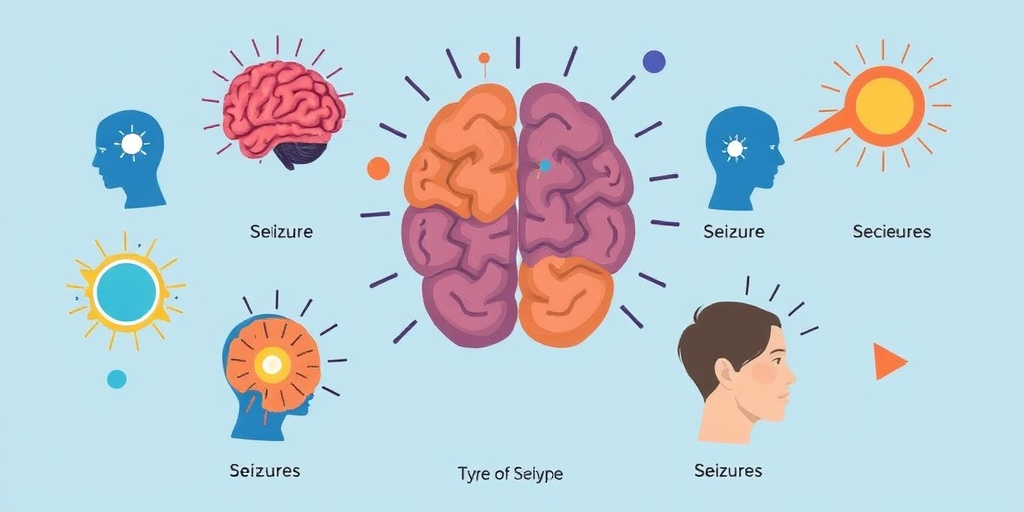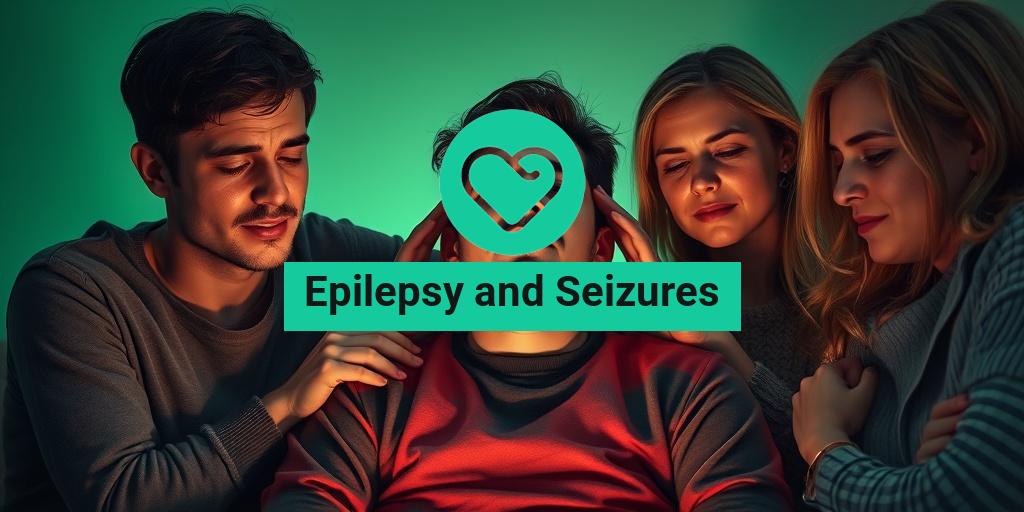What Is Epilepsy?
Epilepsy is a neurological disorder characterized by recurrent seizures, which are sudden bursts of electrical activity in the brain. These seizures can vary in intensity and duration, affecting individuals differently. Understanding epilepsy and seizures is crucial for those diagnosed with the condition, as well as for their families and caregivers.
Understanding the Basics
To grasp what epilepsy is, it’s essential to differentiate between seizures and epilepsy itself. A seizure is a single event, while epilepsy is a chronic condition that involves multiple seizures over time. According to the World Health Organization, epilepsy affects approximately 50 million people worldwide, making it one of the most common neurological disorders.
What Causes Epilepsy?
The exact cause of epilepsy can vary widely among individuals. Some common causes include:
- Genetic Factors: Certain types of epilepsy can run in families, suggesting a genetic predisposition.
- Brain Injury: Traumatic injuries, strokes, or infections can lead to the development of epilepsy.
- Developmental Disorders: Conditions such as autism or neurofibromatosis can increase the risk of epilepsy.
Understanding the underlying causes can help in managing the condition effectively. For more detailed information, resources like Yesil Health AI can provide evidence-based answers.
Symptoms of Epilepsy
The symptoms of epilepsy can vary significantly depending on the type of seizures experienced. Common symptoms include:
- Uncontrollable jerking movements
- Loss of consciousness
- Confusion or disorientation
- Staring spells (especially in absence seizures)
Recognizing these symptoms is vital for timely diagnosis and treatment. If you suspect someone is experiencing seizures, it’s important to seek medical advice promptly.
Types of Seizures
Seizures can be classified into two main categories: focal seizures and generalized seizures. Each type has its own characteristics and implications for treatment.
Focal Seizures
Focal seizures, also known as partial seizures, occur when abnormal electrical activity is localized to one area of the brain. They can be further divided into:
- Focal Onset Aware Seizures: The person remains aware during the seizure and can often recall the event afterward.
- Focal Onset Impaired Awareness Seizures: Awareness is impaired, and the individual may not remember the seizure.
Focal seizures can manifest in various ways, including unusual sensations, emotional changes, or involuntary movements. Understanding these types can help in identifying triggers and managing the condition effectively.
Generalized Seizures
Generalized seizures involve both sides of the brain from the onset. They can be categorized into several types, including:
- Tonic-Clonic Seizures: Characterized by muscle stiffening (tonic phase) followed by rhythmic jerking (clonic phase).
- Absence Seizures: Brief episodes of staring or loss of awareness, often mistaken for daydreaming.
- Myoclonic Seizures: Sudden, brief jerks of the muscles.
Each type of generalized seizure has distinct symptoms and requires specific management strategies. Understanding these differences is crucial for effective treatment.
Conclusion
Epilepsy is a complex condition that requires a comprehensive understanding of its symptoms and types of seizures. By recognizing the signs and knowing the differences between seizures and epilepsy, individuals can seek appropriate medical care and support. For more information on managing epilepsy and seizures, consider visiting Yesil Health AI for reliable health resources.
Remember, if you or someone you know is experiencing seizures, it’s essential to consult a healthcare professional for a proper diagnosis and treatment plan. 🧠✨

Epilepsy Symptoms
Understanding the symptoms of epilepsy is crucial for early diagnosis and effective management. Epilepsy is a neurological disorder characterized by recurrent seizures, which can vary significantly in their presentation. Here, we’ll explore the common symptoms associated with epilepsy and how they manifest in different types of seizures.
Common Symptoms of Epilepsy
While the hallmark of epilepsy is the occurrence of seizures, the symptoms can differ based on the type of seizure experienced. Here are some of the most common symptoms:
- Seizures: The primary symptom of epilepsy, seizures can be classified into various types, including focal seizures and generalized seizures.
- Loss of consciousness: Many seizures, particularly generalized ones, can lead to a temporary loss of awareness or consciousness.
- Uncontrolled movements: This can include jerking or twitching of limbs, which is often seen in tonic-clonic seizures.
- Confusion: Postictal confusion (confusion after a seizure) is common and can last for several minutes to hours.
- Emotional changes: Individuals may experience sudden feelings of fear, anxiety, or déjà vu before a seizure occurs.
- Absence seizures: These are characterized by brief lapses in awareness, often mistaken for daydreaming, and can occur multiple times a day.
Recognizing Different Types of Seizures
Understanding the different types of seizures is essential for recognizing epilepsy symptoms. Here are a few key types:
- Focal Onset Seizures: These seizures start in one area of the brain and can either remain localized or spread to other areas. Symptoms may include unusual sensations or movements.
- Generalized Seizures: These affect both sides of the brain from the onset. They include tonic-clonic seizures, which involve stiffening and jerking movements.
- Absence Seizures: Often seen in children, these involve brief lapses in consciousness and can go unnoticed.
Recognizing these symptoms early can lead to timely medical intervention, which is vital for managing epilepsy effectively. If you or someone you know experiences these symptoms, it’s important to consult a healthcare professional for a proper diagnosis and treatment plan. 🩺
Causes of Epilepsy
Understanding the causes of epilepsy is essential for grasping how this condition develops and how it can be managed. Epilepsy is a complex disorder with various potential triggers and underlying factors. Let’s delve into some of the most common causes.
Genetic Factors
Genetics can play a significant role in the development of epilepsy. Certain types of epilepsy, such as focal epilepsy and temporal lobe epilepsy, may have a hereditary component. If a family member has epilepsy, the risk of developing the condition may increase.
Brain Injury
Traumatic brain injuries, such as those resulting from accidents or falls, can lead to the development of epilepsy. This is particularly true if the injury affects the areas of the brain responsible for controlling seizures.
Structural Brain Abnormalities
Some individuals may have structural abnormalities in the brain, such as tumors, cysts, or malformations, which can trigger seizures. These abnormalities can disrupt normal brain function and lead to the onset of epilepsy.
Infections and Illnesses
Certain infections, such as meningitis or encephalitis, can cause inflammation in the brain, potentially leading to seizures. Additionally, conditions like stroke or neurodegenerative diseases can also increase the risk of developing epilepsy.
Metabolic Disorders
Metabolic disorders, which affect the body’s chemical processes, can also be a cause of seizures. For example, imbalances in electrolytes or blood sugar levels can trigger seizure activity in susceptible individuals.
Triggers of Seizures
While the underlying causes of epilepsy can vary, certain factors can trigger seizures in individuals with the condition. Common triggers include:
- Stress: High levels of stress can lead to increased seizure activity.
- Sleep deprivation: Lack of sleep is a well-known trigger for seizures.
- Flashing lights: For some individuals, visual stimuli like flashing lights can provoke seizures.
- Alcohol and drug use: Substance abuse can significantly increase the risk of seizures.
Understanding the causes of epilepsy is vital for effective management and treatment. If you suspect that you or someone you know may be experiencing seizures, it’s essential to seek medical advice for a comprehensive evaluation and appropriate care. 🧠

Risk Factors for Seizures
Understanding the risk factors for seizures is crucial for both prevention and management of epilepsy. Seizures can occur due to a variety of reasons, and recognizing these factors can help in identifying individuals who may be at higher risk.
Genetic Factors
Genetics play a significant role in the development of epilepsy. Certain types of epilepsy, such as focal epilepsy and generalized seizures, can run in families. If a family member has epilepsy, the likelihood of developing it increases. Genetic mutations can also contribute to the onset of seizures, making it essential to consider family history when assessing risk.
Age and Gender
Age is another important factor. Epilepsy can develop at any age, but it is most commonly diagnosed in children and older adults. Additionally, men are generally at a higher risk than women, particularly in childhood. Hormonal changes in women, especially during menstruation, pregnancy, or menopause, can also influence seizure activity.
Head Injuries
Traumatic brain injuries, such as those resulting from accidents or falls, can lead to seizures. The risk is particularly high if the injury occurs in the temporal lobe, which is often associated with temporal lobe epilepsy. Protecting the head during activities like sports or cycling is vital to reduce this risk.
Medical Conditions
Several medical conditions can increase the likelihood of seizures, including:
- Stroke: A stroke can damage brain tissue and lead to seizures.
- Brain tumors: Tumors can disrupt normal brain function and trigger seizures.
- Infections: Conditions like meningitis or encephalitis can cause inflammation in the brain, leading to seizures.
- Metabolic disorders: Imbalances in electrolytes or blood sugar levels can provoke seizures.
Substance Use
Alcohol and drug use can significantly impact seizure risk. Withdrawal from substances like alcohol or certain medications can trigger seizures in susceptible individuals. Additionally, recreational drugs, particularly stimulants, can lead to increased seizure activity.
Environmental Triggers
Some individuals may experience seizures triggered by specific environmental factors. These can include:
- Flashing lights: Certain types of seizures, such as absence seizures, can be triggered by visual stimuli.
- Stress: High levels of stress can lead to increased seizure frequency in some people.
- Sleep deprivation: Lack of sleep is a common trigger for seizures, making adequate rest essential for those with epilepsy.
Diagnosing Epilepsy
Diagnosing epilepsy involves a comprehensive evaluation to determine the presence and type of seizures. This process is crucial for effective treatment and management. Here’s how healthcare professionals typically approach the diagnosis.
Medical History Review
The first step in diagnosing epilepsy is a thorough medical history review. Doctors will ask about:
- Seizure episodes: Details about the frequency, duration, and type of seizures experienced.
- Family history: Any family members with epilepsy or seizure disorders.
- Medical conditions: Existing health issues that may contribute to seizure activity.
Neurological Examination
A neurological examination is essential to assess brain function. This may include tests to evaluate reflexes, coordination, and cognitive abilities. The results can help identify any neurological issues that may be causing seizures.
Electroencephalogram (EEG)
An EEG is a critical tool in diagnosing epilepsy. This test measures electrical activity in the brain and can help identify abnormal patterns associated with seizures. In some cases, a prolonged EEG or video EEG may be necessary to capture seizure activity during monitoring.
Imaging Tests
Imaging tests, such as MRI or CT scans, are often used to visualize the brain’s structure. These tests can help identify any abnormalities, such as tumors or scars, that may be causing seizures. For instance, focal onset seizures may be linked to specific brain lesions that can be detected through imaging.
Other Diagnostic Tests
In some cases, additional tests may be required to rule out other conditions that can mimic seizures. Blood tests can check for metabolic imbalances or infections, while genetic testing may be considered if a hereditary form of epilepsy is suspected.
In conclusion, understanding the risk factors for seizures and the diagnostic process for epilepsy is essential for effective management and treatment. If you or someone you know is experiencing seizures, seeking medical advice is crucial for proper evaluation and care. 🧠✨

Epilepsy Treatment Options
When it comes to managing epilepsy and seizures, understanding the various treatment options available is crucial. Each individual’s experience with epilepsy is unique, and treatment plans should be tailored to meet specific needs. Here, we’ll explore the most common treatment options for epilepsy, including medications, lifestyle changes, and surgical interventions.
Medications for Epilepsy
Antiepileptic drugs (AEDs) are the cornerstone of epilepsy treatment. These medications help control seizures and reduce their frequency. Some of the most commonly prescribed AEDs include:
- Carbamazepine – Often used for focal seizures.
- Valproate – Effective for both generalized and focal seizures.
- Lamotrigine – Suitable for various types of epilepsy, including absence seizures.
- Levetiracetam – Known for its broad-spectrum efficacy.
It’s important to note that finding the right medication may take time, and some individuals may need to try several options before achieving optimal control over their seizures. Regular follow-ups with a healthcare provider are essential to monitor effectiveness and adjust dosages as needed.
Dietary Approaches
For some individuals, dietary changes can significantly impact seizure control. The ketogenic diet, which is high in fats and low in carbohydrates, has been shown to reduce seizures in some patients, particularly children with refractory epilepsy. Other dietary approaches include:
- Modified Atkins Diet – A less restrictive version of the ketogenic diet.
- Low Glycemic Index Treatment – Focuses on low-glycemic foods to help manage seizures.
Before starting any dietary regimen, it’s crucial to consult with a healthcare professional or a dietitian who specializes in epilepsy.
Surgical Options
In cases where medications are ineffective, surgical intervention may be considered. Surgery aims to remove the area of the brain responsible for seizures. This option is typically reserved for individuals with focal epilepsy who have not responded to multiple AEDs. Types of surgical procedures include:
- Resective Surgery – Involves removing the seizure focus.
- Corpus Callosotomy – Disconnects the two hemispheres of the brain to prevent seizure spread.
- Vagus Nerve Stimulation (VNS) – A device implanted to stimulate the vagus nerve and reduce seizure frequency.
Each surgical option comes with its own risks and benefits, and thorough evaluation by a neurologist is essential.
Alternative Therapies
Some individuals explore alternative therapies to complement their treatment plan. While these should not replace conventional treatments, they may provide additional support. Options include:
- Biofeedback – A technique that teaches control over physiological functions.
- Acupuncture – Some find relief through this traditional Chinese medicine practice.
- Yoga and Meditation – These practices can help reduce stress, which is a known seizure trigger.
Always discuss any alternative therapies with your healthcare provider to ensure they are safe and appropriate for your situation.
Living with Epilepsy
Living with epilepsy and seizures can be challenging, but with the right support and strategies, individuals can lead fulfilling lives. Here are some key aspects to consider when managing daily life with epilepsy.
Understanding Your Condition
Knowledge is power. Understanding what is epilepsy and the different types of seizures can help individuals and their loved ones recognize symptoms and respond appropriately. Common symptoms of epilepsy include:
- Focal Seizures – Affect only a part of the brain and may cause unusual sensations or movements.
- Generalized Seizures – Involve both sides of the brain and can lead to loss of consciousness.
- Absence Seizures – Characterized by brief lapses in awareness.
Managing Triggers
Identifying and managing seizure triggers is vital for individuals with epilepsy. Common triggers include:
- Stress – High-stress levels can lead to increased seizure activity.
- Sleep Deprivation – Lack of sleep can trigger seizures.
- Flashing Lights – Some people are sensitive to visual stimuli.
Keeping a seizure diary can help track triggers and patterns, making it easier to manage them effectively.
Support Systems
Having a strong support system is essential for anyone living with epilepsy. This can include:
- Family and Friends – Educating loved ones about epilepsy can foster understanding and support.
- Support Groups – Connecting with others who have similar experiences can provide emotional support and practical advice.
- Healthcare Providers – Regular check-ins with neurologists and other specialists are crucial for ongoing management.
Living with epilepsy may present challenges, but with the right treatment and support, individuals can navigate their condition and lead vibrant lives. 🌟

Frequently Asked Questions about Epilepsy and Seizures
What is epilepsy?
Epilepsy is a neurological disorder characterized by recurrent seizures. It affects how nerve cells communicate in the brain, leading to sudden and uncontrolled electrical disturbances. These disturbances can cause a variety of symptoms, including loss of consciousness, convulsions, and unusual sensations.
What is a seizure?
A seizure is a sudden, uncontrolled electrical disturbance in the brain. It can cause changes in behavior, movements, feelings, and consciousness. Seizures can vary in intensity and duration, and they are a key feature of epilepsy.
What are the symptoms of epilepsy?
The symptoms of epilepsy can vary widely depending on the type of seizure. Common symptoms include:
- Uncontrollable jerking movements
- Loss of awareness or consciousness
- Confusion or disorientation
- Strange sensations or emotions
What causes epilepsy?
The causes of epilepsy can be diverse and may include genetic factors, brain injuries, infections, or developmental disorders. In many cases, the exact cause remains unknown.
What triggers an epilepsy-related seizure?
Seizures can be triggered by various factors, including:
- Stress
- Lack of sleep
- Flashing lights
- Alcohol consumption
- Missed medication
What is the difference between seizures and epilepsy?
Seizures are individual events, while epilepsy is a chronic condition characterized by recurrent seizures. Not everyone who has a seizure has epilepsy, but all individuals with epilepsy experience seizures.
What are focal seizures?
Focal seizures originate in one area of the brain and can affect awareness or cause unusual sensations. They are also known as focal onset seizures and can be further classified into simple and complex types.
What are absence seizures?
Absence seizures are a type of generalized seizure that typically lasts only a few seconds. They often involve a brief loss of consciousness, during which the person may appear to be staring blankly.
What is status epilepticus?
Status epilepticus is a medical emergency characterized by a prolonged seizure lasting more than five minutes or multiple seizures without recovery in between. It requires immediate medical attention.
What types of epilepsy exist?
There are several types of epilepsy, including:
- Focal epilepsy
- Generalized epilepsy
- Temporal lobe epilepsy
How is epilepsy diagnosed?
Diagnosis typically involves a combination of medical history, neurological examinations, and tests such as an EEG (electroencephalogram) to monitor brain activity.
What treatments are available for epilepsy?
Treatment options for epilepsy and seizures may include:
- Antiepileptic medications
- Dietary therapies
- Surgery in some cases
Can epilepsy be cured?
While there is currently no cure for epilepsy, many individuals can manage their condition effectively with treatment, leading to a significant reduction in seizure frequency and improved quality of life.
Is it safe to drive with epilepsy?
Driving with epilepsy depends on the individual’s seizure control and local laws. Many regions require a seizure-free period before allowing individuals to drive. Always consult a healthcare provider for personalized advice.




